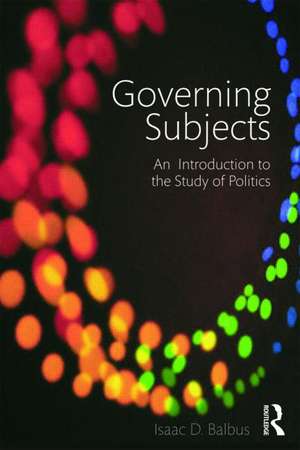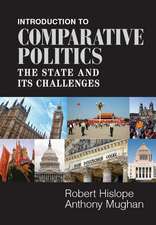Governing Subjects: An Introduction to the Study of Politics
Autor Isaac D. Balbusen Limba Engleză Paperback – 18 noi 2009
| Toate formatele și edițiile | Preț | Express |
|---|---|---|
| Paperback (1) | 487.16 lei 6-8 săpt. | |
| Taylor & Francis – 18 noi 2009 | 487.16 lei 6-8 săpt. | |
| Hardback (1) | 1281.83 lei 6-8 săpt. | |
| Taylor & Francis – 18 noi 2009 | 1281.83 lei 6-8 săpt. |
Preț: 487.16 lei
Nou
Puncte Express: 731
Preț estimativ în valută:
93.22€ • 97.53$ • 77.44£
93.22€ • 97.53$ • 77.44£
Carte tipărită la comandă
Livrare economică 02-16 aprilie
Preluare comenzi: 021 569.72.76
Specificații
ISBN-13: 9780415998901
ISBN-10: 0415998905
Pagini: 304
Dimensiuni: 152 x 229 x 15 mm
Greutate: 0.56 kg
Ediția:1
Editura: Taylor & Francis
Colecția Routledge
Locul publicării:Oxford, United Kingdom
ISBN-10: 0415998905
Pagini: 304
Dimensiuni: 152 x 229 x 15 mm
Greutate: 0.56 kg
Ediția:1
Editura: Taylor & Francis
Colecția Routledge
Locul publicării:Oxford, United Kingdom
Cuprins
Preface. Acknowledgments. General Introduction. Part 1: Law and Institutions 1. Law and the Rule of Law 2. The Separation of Powers 3. Judicial Review 4. Conceptions of Democracy: "Thick" versus "Thin" 5. The Concept (and Reality?) of Representation 6. Political Parties 7. Elections 8. Civil Society Part 2: Markets and Power Introduction to Part Two 9. Human Nature and the Market 10. Freedom and the Market 11. Justice and the Market 12. Democracy and the Market I: Corporations and the State 13. Democracy and the Market II: Corporate Governance 14. Democracy and the Market III: Globalization and Governance 15. The Concept of Power I: The Three Faces of "Negative" Power 16. The Concept of Power II: Normalization versus Communication Part 3: Culture and Identity Introduction to Part Three 17. What is (a) Culture? 18. Beyond Ethnocentrism and Relativism? 19. Modernity 20. Modernity and Identity 21. Gender Identity 22. Racial Identity 23. National Identity 24. Religious Identity Part 4: Conclusion Introduction to Part Four 25. The Subject 26. The Subject in the Group 27. Identity Politics Revisited 28. The Subject in Nature. Glossary of Names. Bibliography. Endnotes
Recenzii
"Isaac Balbus's Governing Subjects is not one but several books and all of them are successful. First there is a marvelously accessible survey of all the key issues in political and cultural theory. Second there is a critical (in the sense of serious) analysis of the philosophical and sociological arguments brought to bear on those issues in the last 200 years. And third there is his own explication and urging of a ‘reparative’ approach to the problems inherent in modernity and its discontents. The learning is obvious, but it is offered in a way that is always enlightening and never intimidating or pretentious. A real achievement."
—Stanley Fish, Florida International University
"This stimulating book exhibits the intellectual range and pedagogical flair long associated with Isaac Balbus. Governing Subjects offers a bracing invitation to a capacious and deep, disciplined but cross-disciplinary, study of politics. Not just its primary undergraduate audience, but graduate students and faculty alike have much to gain by engaging with its bold arguments and learned assessments."
—Ira Katznelson, Ruggles Professor of Political Science and History, Columbia University
"American political science today is all too driven by concerns that render it unduly narrow in both methods and substance. In both these regards, Isaac Balbus's Governing Subjects is a welcome, valuable resource."
—Rogers Smith, University of Pennsylvania
"This introduction to politics uniquely draws resources from both theoretical and empirical scholarship in political science. It is an introduction in the best sense: it not only covers the basics but it is written engagingly and accessibly to introduce students to challenging controversies. The dialogic structure of the chapters, which set opposing views in conversation with each other, lends itself to active learning strategies in the classroom."
—Lisa Disch, University of Michigan
"Summing Up: Recommended. All undergraduate, graduate, and research collections." - E. J. Eisenach, CHOICE (July 2010)
—Stanley Fish, Florida International University
"This stimulating book exhibits the intellectual range and pedagogical flair long associated with Isaac Balbus. Governing Subjects offers a bracing invitation to a capacious and deep, disciplined but cross-disciplinary, study of politics. Not just its primary undergraduate audience, but graduate students and faculty alike have much to gain by engaging with its bold arguments and learned assessments."
—Ira Katznelson, Ruggles Professor of Political Science and History, Columbia University
"American political science today is all too driven by concerns that render it unduly narrow in both methods and substance. In both these regards, Isaac Balbus's Governing Subjects is a welcome, valuable resource."
—Rogers Smith, University of Pennsylvania
"This introduction to politics uniquely draws resources from both theoretical and empirical scholarship in political science. It is an introduction in the best sense: it not only covers the basics but it is written engagingly and accessibly to introduce students to challenging controversies. The dialogic structure of the chapters, which set opposing views in conversation with each other, lends itself to active learning strategies in the classroom."
—Lisa Disch, University of Michigan
"Summing Up: Recommended. All undergraduate, graduate, and research collections." - E. J. Eisenach, CHOICE (July 2010)
Notă biografică
Isaac D. Balbus is professor of political science at the University of Illinois at Chicago. He is the author of four previous books and has won several awards for excellence in teaching.
Descriere
This introduction to the study of politics explores the multiple meanings of "governance" as well as the several senses of what it means to be a "subject." It takes the reader on a journey through and across the domains of law and institutions, markets and power, and culture and identity, and shows how the understanding of any one of these domains demands an understanding of them all. The path through these related regions is marked by regular encounters with leading and competing thinkers—from the expected, such as James Madison, Robert Dahl, Michel Foucault, and Adam Smith, to the unexpected, such as Joseph Raz, Lisa Disch, Doug Henwood, and Joan Scott—that encourage the reader to evaluate their arguments for their internal coherence and explanatory power. Governing Subjects is at once a holistic and critical introduction to the study of politics.
















